- Home
- K. A. Tucker
The Simple Wild_A Novel Page 3
The Simple Wild_A Novel Read online
Page 3
“Dammit!” The touchdown was hard and I’ll likely be bruised, but right now what hurts most is the four-inch heel lying next to my foot, snapped off the base. I peel the ruined Louboutin stiletto off my foot and aim for the raccoons, throwing it with all my strength. But they’ve already safely settled under the car, and now they watch me, the stream of light from the porch glinting off their beady eyes.
The front door opens and Simon appears. “Calla, are you still here?” He spots me sprawled out in the garden and frowns.
“Tim and Sid are back,” I mutter. The pair stopped coming around last month, after frequenting our property every Thursday night for the better part of a year. I assumed they’d either found another family to terrorize or had been hit by a car.
“I had a feeling they’d return.” He holds out the receiver. “From Alaska.”
I shake my head, mouthing, “I’m not home,” though it’s already too late.
Simon’s bushy brows arch as he waits, his arm outstretched. He’d never cover for me anyway. The psychiatrist in him believes in facing problems, not avoiding them.
And my biggest problem, according to Simon, is my relationship with Wren Fletcher. Or lack thereof, because I hardly know the man. I thought I knew him, back when I’d dial his number and listen to the ring, imagining the room and the house and the man on the other side. Of course, I knew what my real father looked like. My mom had shown me pictures of him, of his shaggy peanut-butter-brown hair and his soft gray eyes, wearing a navy-blue-and-black plaid jacket and jeans in mid-August, standing proudly next to a row of planes. She called him ruggedly handsome, and I somehow knew what she meant without understanding it at my young age.
Sometimes he wouldn’t answer, and I’d be bereft for the entire day. But other times, when I was lucky, I’d catch him coming or going. We’d talk for fifteen or so minutes, about school and my friends, or the hobbies I was into at the time. It was mostly me speaking but I hardly noticed, happy to prattle on. Mom says Dad never was a big talker.
She also said that we would never live together as a family. That my dad’s life was in Alaska and ours was in Toronto, and there was no way around that reality. I learned to accept it early on. I didn’t know any different. Still, I’d always ask him to fly out to visit me. I mean, he had all these planes to choose from, so why couldn’t he just hop in one of them and come?
He always had an excuse, and Mom never tried to coax him. She knew better.
Me, though? I only ever saw him through the enchanted eyes of a little girl who desperately wanted to meet the quiet man on the other side of the phone.
I pull myself up and dust the dirt off my behind. And then I hobble to the front steps in my one shoe, glaring at my ever-understanding and patient stepdad.
Finally, I take the phone from his hand.
“Hello.”
“Hello. Calla?” a woman asks.
I frown at Simon. “Yeah. Who’s this?”
“My name is Agnes. I’m a friend of your father’s. I found your number among Wren’s things.”
“Okay . . .” An unexpected spark of fear ignites inside me. What was she doing in his things? “Did something happen to him?”
“I guess you could say that.” She pauses, and I find myself holding my breath, dreading the answer. “Your father has lung cancer.”
“Oh.” I take a seat on the top of the steps, suddenly feeling wobbly-legged. Simon eases down onto the step beside me.
“I know things have been difficult between the two of you for some time, but I thought you’d like to know.”
Difficult? More like nonexistent.
There’s a long pause. “I only know because I found a copy of the test results in his pocket when I went to do his laundry. He doesn’t know that I’m calling you.”
I hear what she doesn’t say: He wasn’t going to tell me that he has cancer. “So . . . how bad is it?”
“I’m not sure, but the doctors have recommended a treatment plan.” She has a reedy voice and a slight accent that reminds me of my father’s, from what I remember of it.
I don’t know what else to say except, “Okay. Well . . . I’m sure the doctors know what they’re doing. Thanks for calling and letting me know—”
“Why don’t you come here for a visit?”
My mouth drops open. “Here? What, you mean . . . to Alaska?”
“Yes. Soon. Before treatment starts. We’ll pay for your ticket, if that’s what it would take. It’s high season right now, but I found an available seat to Anchorage for this Sunday.”
“This Sunday?” As in three days from now?
“Jonah could bring you the rest of the way.”
“I’m sorry, who’s Jonah?” My head is spinning.
“Oh.” Her laughter is soft and melodic in my ear. “Sorry. He’s our best pilot. He’d make sure you got here safe and sound.”
Our best pilot, I note. We’ll pay for your ticket. She said she was a friend, but I’m gathering that Agnes is more than that.
“And Wren would love to see you.”
I hesitate. “He told you that?”
“He doesn’t have to.” She sighs. “Your father . . . he’s a complicated man, but he does love you. And he has many regrets.”
Maybe this Agnes woman is okay with all the things Wren Fletcher doesn’t say and do, but I’m not. “I’m sorry. I can’t just hop on a plane and come to Alaska . . .” My words drift. Actually, as of this moment, I have no job or other major commitments. And as far as Corey is concerned, I could probably fly to Alaska and come back without him ever being the wiser.
I could just leave, but that’s beside the point.
“I know this is a lot to take in. Please, think about it. You’d get the chance to know Wren. I think you’d really like him.” Her voice has grown husky. She clears it. “Do you have something to write with?”
“Uh . . . yeah.” I pluck the pen from the breast pocket of Simon’s button-down shirt—I can always count on him to have one at the ready—and jot down her phone number on the back of his hand, though it’s likely already on the call display. She also gives me her email address.
I’m in a daze when I hang up with her. “He has cancer.”
“I gathered it was something along those lines.” Simon puts an arm around my shoulders and pulls me into him. “And this woman who called wants you to visit him.”
“Agnes. Yeah. She wants me to visit him. He doesn’t want me there. He wasn’t even going to tell me. He was just going to go and die, without giving me any warning.” My voice cracks. This man who I don’t even know still wounds me so deeply.
“And how does that make you feel?”
“How do you think that makes me feel!” I snap, tears threatening.
Simon remains calm and collected. He’s used to being yelled at for his prodding questions—by my mom and me, and by his patients. “Do you want to fly to Alaska to meet your father?”
“No.”
He raises an eyebrow.
I sigh with exasperation. “I don’t know!”
What am I supposed to do with this information? How am I supposed to feel about possibly losing a person who has only ever hurt me?
We sit quietly and watch as Tim and Sid venture out from beneath the car, their humps bobbing with their steps as they head for the bins at the end of our driveway, standing on their hind legs to paw at the blue one, attempting to knock it over with their weight. They chatter back and forth to each other, only bothering with an occasional glance at their audience.
I sigh. “He’s never made an effort to get to know me. Why should I bother making the effort now?”
“Would there be a better time?”
That’s Simon. Always answering a question with another question.
“Let me ask you this: Do you think you could gain someth
ing from going to Alaska?”
“Besides a picture with my mom’s sperm donor?”
Simon grimaces his disapproval at my poor attempt at humor.
“Sorry,” I mumble. “I guess I just have low expectations for a man who hasn’t cared enough to meet his daughter once in twenty-four years.” He was supposed to come to Toronto. He called me four months before my eighth-grade graduation, to say that he was coming for it. I started crying the moment I hung up. All the anger and resentment that’d been building up over the years, for all the birthdays and holidays he’d missed, disintegrated instantly. And I truly believed that he’d be there, that he’d be sitting in the audience with a proud grin on his face. I believed it, right up until he called, two days before the ceremony, to say that “something” came up. An emergency at work. He wouldn’t elaborate.
My mother called him back. I heard her seething voice through the walls. I heard the ultimatum she delivered through tears—that either he sort his priorities out and finally show up for his daughter or get out of our lives for good, monthly child support checks and all.
He never showed up.
And when I stood on the stage, accepting my academic award, it was with puffy eyes and a forced smile, and a silent promise to myself that I would never trust him again.
Simon hesitates, his wise gaze peering out into the darkness. “Did you know that your mother was still in love with Wren when we got married?”
“What? No, she wasn’t.”
“She was. Very much so.”
I frown. “But she was married to you.”
“That doesn’t mean she didn’t still love him.” A pensive look fills his face. “Do you remember when your mother went through that phase, when she changed her hair and started working out almost every day? She was highly irritable with me.”
“It’s fuzzy, but yeah.” She dyed her hair platinum blonde, and started going to yoga obsessively, reversing the softening effects of middle age and turning her body hard again. She was throwing petty jabs at Simon between sips of morning coffee, picking at his personal faults over lunch, sparking colossal fights over everything he wasn’t by dinner.
I remember thinking it was odd, that I’d never seen them fight at all, let alone that frequently.
“That all began after Wren called to say he was coming.”
“No, it didn’t,” I begin to argue, before stopping myself. Simon would have a much better grasp of that timeline than I would.
“When your mother left Wren, she did it hoping that he would change his mind about staying in Alaska. He never did, but she never stopped loving him, despite it. Eventually she knew she had to move on. She met me, and we married. And then all of a sudden he was coming here, back into her life. She didn’t know how to deal with seeing him again, after so many years. She was . . . conflicted about her feelings for the both of us.” If Simon is bitter about admitting this, he doesn’t show it.
“That must have been hard for you.” My heart pangs for the man I’ve come to know and love as a more than suitable replacement for my birth father.
Simon smiles sadly. “It was. But I noticed a change in her after your graduation. She was less anxious. And she stopped crying.”
“She was crying?”
“At night, when she thought I’d gone to sleep. Not often, but often enough. I’m guessing it was guilt over harboring feelings for him. And fear for what might happen when she saw him again, especially so soon after marrying me.”
What exactly is Simon suggesting?
He presses his thin lips together as he wipes the lenses of his reading glasses on the cuff of his sleeve. “I think she finally accepted that neither of you would ever have the relationship you longed for with him. That wanting someone to be something they’re not won’t make it happen.” Simon hesitates. “I’ll selfishly admit that I wasn’t entirely unhappy that he never came. It was clear to me that if Wren were willing to give up his home, my marriage to your mother would have dissolved.” He toys with the gold wedding band around his ring finger. “I will always play second fiddle to that man. I knew that the day I asked her to be my wife.”
“But why would you marry her, then?” As glad as I am that he did, for her sake as well as mine, it seems like an odd proclamation.
“Because while Susan may have been madly in love with Wren, I was madly in love with her. Still am.”
That, I know. I’ve seen it, with every lengthy look, with every passing kiss. Simon loves my mother deeply. At their wedding, my grandfather gave a mildly inappropriate speech, commenting on the two of them being an unlikely pair—that my mother is this vibrant and impulsive woman, while Simon is a calm and practical old soul. “An unexpected match, but he’ll sure as hell make her much happier than that last one” were my grandfather’s exact words over the microphone to a room of a hundred guests.
The old man was probably right, though, because Simon dotes on my mother, granting her every self-satisfying whim and wish. They vacation at expensive, all-inclusive tropical resorts when he’d rather be visiting dusty churches and ancient libraries; he’s her pack mule when she decides she needs a fresh wardrobe, schlepping countless bags through the streets of Yorkville; he humors her love of Sunday road trips to country markets and then comes home sneezing from the dozen allergens that plague him; he’s given up gluten and red meat because Mom has decided she doesn’t want to eat them. When we redecorated the house, my mother chose a palette of soft grays and pale mauves. Simon later confided in me that he despises few things and, oddly enough, the color mauve is one of them.
In the past, I’ve found myself silently mocking the gangly Englishman for never putting his foot down with my mother, for never showing a spine. But now, as I gaze at his narrow, kind face—his feather-thin hair long since receded from his forehead—I can’t help but admire him for all that he’s put up with while loving her.
“Did she ever admit her feelings to you?” I dare ask.
“No,” Simon scoffs, his brow furrowing deeply. “She’ll never admit any of this to me and don’t bother confronting her about it. It’ll only stir up guilt that does none of us any good.”
“Right.” I sigh. “So, should I go to Alaska?”
“I don’t know. Should you?”
I roll my eyes at him. “Why can’t you be a normal parent and tell me what to do for once?”
Simon grins, in that way that tells me he’s secretly delighted that I referred to him as a parent. Even though he’s always said that he sees me as his daughter, I think he would have been happy to have children of his own, had my mother been willing. “Let me ask you this: What was your first thought when Agnes told you your father has cancer?”
“That he’s going to die.”
“And how did that thought make you feel?”
“Afraid.” I see where Simon’s going with this. “Afraid that I’ll miss my chance to meet him.” Because no matter how many times I’ve lain in bed, wondering why my father didn’t love me enough, the little girl inside me still desperately wants him to.
“Then I think you should go to Alaska. Ask the questions you need to ask, and get to know Wren. Not for him, but for you. So you don’t find yourself ruled by deep regrets in the future. Besides . . .” He bumps shoulders with me. “I don’t see any other pressing matters in your life at the moment.”
“Funny how that worked out, eh?” I murmur, thinking of the chatty custodian on the subway earlier today. “It must be fate.”
Simon gives me a flat look, and I laugh. He doesn’t believe in fate. He doesn’t even believe in astrology. He thinks people who follow their horoscopes have deeply repressed issues.
I sigh. “It’s not like he lives in the nice part of Alaska.” Not that I remember any part of Alaska from my brief time there—nice or otherwise. But Mom has used the words “barren wasteland” enough to turn me off the pla
ce. Though she tends to be dramatic. Plus, she’s a city lover. She can’t handle the Muskokas for more than a night, and not without dousing herself in mosquito repellent every fifteen minutes while reminding everyone incessantly about the risk of West Nile.
“I’ll think about it.” I mentally start reorganizing my schedule. And groan. If I leave on Sunday, I’ll miss next week’s hair appointment. Maybe I can beg Fausto to squeeze me in Saturday morning. Highly unlikely. He’s normally booked four weeks in advance. Thankfully I have a standing nail appointment on Saturday afternoons and I had my eyelashes done last weekend. “I just paid for ten more hot yoga sessions. And what about squash? Mom would need to find a replacement partner.”
“All things you managed to work around when you went to Cancún last year.”
“Yeah . . . I guess,” I admit reluctantly. “But Alaska is a million hours away.”
“Only half a million,” Simon quips.
“Will you at least give me a script for Ambi—”
“No.”
I sigh with exaggeration. “What fun is having a stepdad with a prescription pad, then?” My phone starts ringing from its resting spot on the hood of Simon’s car. “Crap, that’s Diana. She’s in a line somewhere, mentally stabbing me.” As if on cue, a black Nissan Maxima coasts up to the curb in front of the house. “And that’s my Uber.” I look down at my missing heel and my soiled dress. “And I need to change.”
Simon eases himself off the step and heads toward the waiting garbage can. “I suppose I can manage this last one for you. Just this once. After all, you have had quite the day.”
He charges forward in a funny shuffle that sends Tim and Sid scurrying into the hedge before struggling to wheel the can into place. For all that makes Simon endearing, he is neither coordinated nor strong. Mom has tried and failed to get him to a gym to add some muscle to his spindly arms.
A thought strikes me. “What are you going to do about garbage day if I go to Alaska?”

 The Simple Wild
The Simple Wild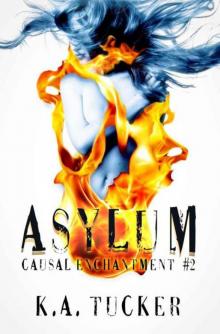 Asylum
Asylum Anathema
Anathema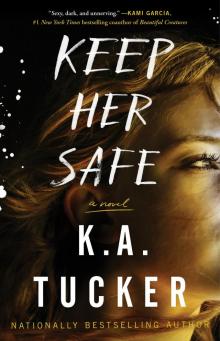 Keep Her Safe
Keep Her Safe Chasing River
Chasing River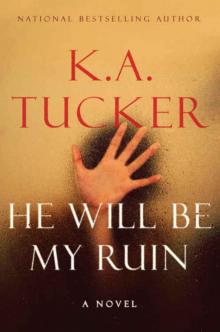 He Will Be My Ruin
He Will Be My Ruin Four Seconds to Lose
Four Seconds to Lose The Simple Wild_A Novel
The Simple Wild_A Novel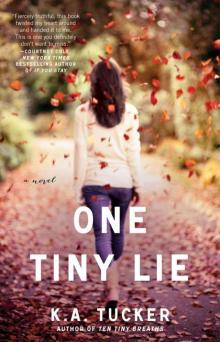 One Tiny Lie
One Tiny Lie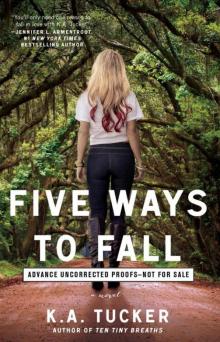 Five Ways to Fall
Five Ways to Fall Until It Fades
Until It Fades Allegiance
Allegiance Say You Still Love Me: A Novel
Say You Still Love Me: A Novel Burying Water
Burying Water The Player Next Door: A Novel
The Player Next Door: A Novel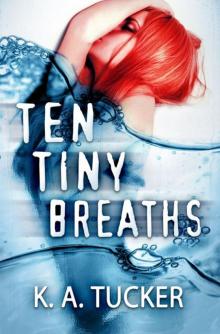 Ten Tiny Breaths
Ten Tiny Breaths A Fate of Wrath & Flame
A Fate of Wrath & Flame Forever Wild
Forever Wild Anomaly
Anomaly In Her Wake
In Her Wake Surviving Ice
Surviving Ice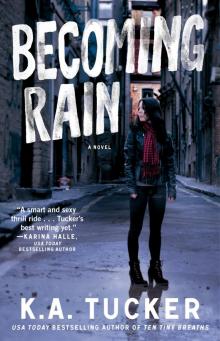 Becoming Rain
Becoming Rain Running Wild: A novel
Running Wild: A novel Four Seconds to Lose: A Novel
Four Seconds to Lose: A Novel Four Seconds to Lose ttb-3
Four Seconds to Lose ttb-3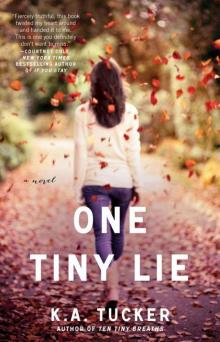 One Tiny Lie: A Novel
One Tiny Lie: A Novel Anomaly (Causal Enchantment)
Anomaly (Causal Enchantment)